Drum machines have significantly transformed the realm of electronic music, providing exceptional sound quality and creative versatility.
Whether one is an aspiring producer or an experienced musician, comprehending the advantages of these powerful tools can greatly enhance their sound.
This article will examine the factors to consider when selecting the appropriate drum machine, review some of the best options available in the market, and provide tips to maximize production potential.
Prepare to elevate your music-making journey.
What is a Drum Machine?
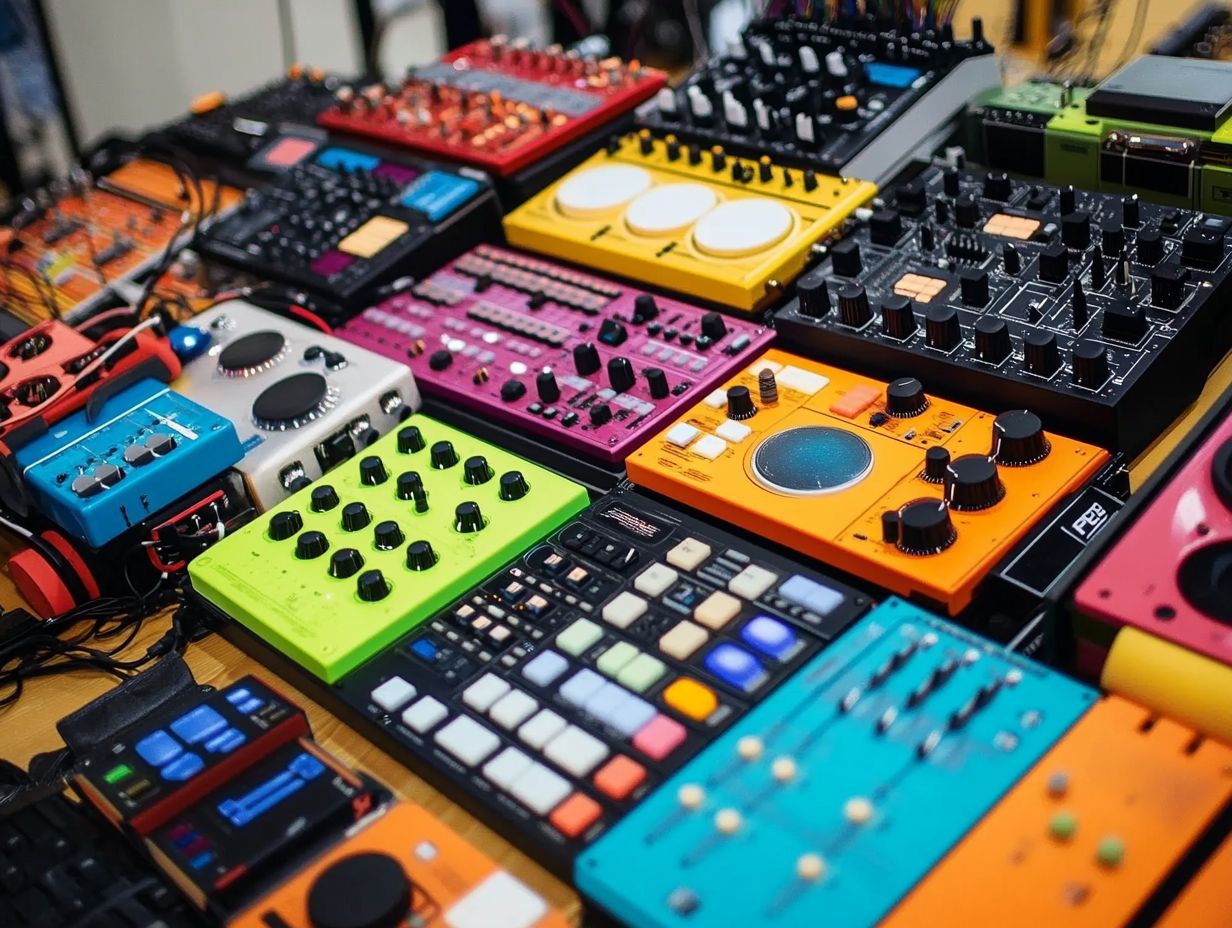
A drum machine is an electronic device specifically designed to produce percussion sounds and rhythmic patterns, applicable across various music genres, including electronic music and hip-hop production. These devices range from vintage drum machines, renowned for their distinctive sounds, to modern drum machines that incorporate advanced MIDI capabilities, real-time controls, and customizable sounds, accommodating both live performances and studio recording requirements.
Tracing back to the late 1960s, when early models were introduced to enhance musical compositions, drum machines have undergone significant evolution. Initially, they were basic devices reliant on pre-recorded samples, often lacking in versatility.
Advancements in sound design technology have facilitated the development of programmable features, enabling musicians to create unique drum patterns. Contemporary hardware models, such as the iconic Roland TR-808, are celebrated for their distinct character and warmth, while software alternatives offer unmatched flexibility and integration with digital audio workstations.
This transition from vintage to modern design underscores the essential role of the drum machine in shaping musical landscapes across genres, from techno to pop, fostering innovation and experimentation in sound production.
Benefits of Using a Drum Machine for Electronic Music
Utilizing a drum machine for electronic music production presents several advantages, such as improved workflow efficiency, the capacity to develop unique rhythmic patterns, and expanded creative opportunities in beat making.
Drum machines equip musicians with robust tools for sound manipulation, facilitating both intricate sound design and the straightforward creation of loops, thereby enhancing the quality of their music projects.
Improved Sound Quality and Versatility
One of the most significant advantages of utilizing a drum machine is its capacity to enhance sound quality and versatility, allowing producers to explore a wide array of sampling options and drum sounds. Many contemporary drum machines come equipped with high-quality samples and audio outputs, facilitating seamless integration with other music production software and offering limitless possibilities for sound manipulation and creative expression.
These devices feature an extensive library of drum sounds, encompassing everything from traditional acoustic kits to electronic beats, thereby granting musicians the flexibility to blend genres and develop unique rhythms. By employing advanced sampling techniques, producers can tailor their sound palettes through layering samples or adjusting existing ones to align perfectly with their artistic vision.
The robust audio outputs provide exceptional clarity, ensuring that every nuance is captured, which is essential for achieving a polished and professional sound. The overall impact on sound design is substantial, as it enables users to create intricate, engaging tracks while navigating diverse sonic landscapes.
Factors to Consider When Choosing a Drum Machine
When selecting the most suitable drum machine for your requirements, it is essential to consider several factors, including the machine’s features, sound quality, and budget-friendly alternatives that align with your production style.
Furthermore, understanding the brand reputation and the compatibility with your existing equipment can greatly impact your decision, ensuring that you choose a drum machine that effectively enhances your music production capabilities.
Sound Quality, Features, and Budget
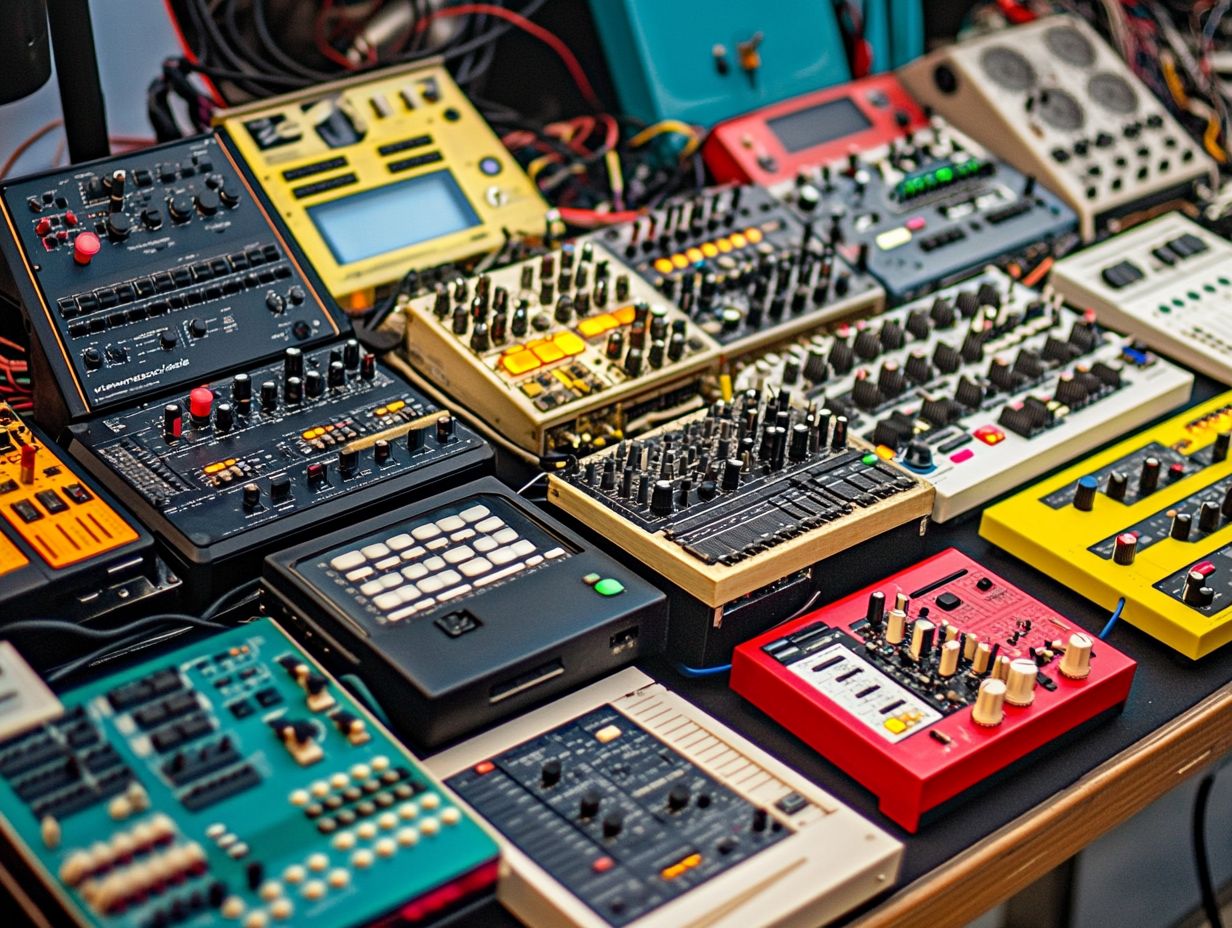
Sound quality, features, and budget are critical factors to consider when selecting a drum machine, as they have a direct impact on the music production experience and outcomes. Affordable drum machines can offer excellent value without sacrificing sound quality, while professional-grade machines provide advanced features and high-quality samples tailored for serious producers.
The objective is to achieve an appropriate balance among these elements that aligns with your specific requirements. Entry-level models may deliver satisfactory sound quality for beginners and casual users; however, they often lack certain features such as programmable patterns or extensive sample libraries, which can hinder creative expression.
Conversely, investing in a professional-grade drum machine ensures superior sound fidelity and a wide range of customizable options, albeit at a higher price point. Therefore, it is essential to identify which features are most important to you and how they fit within your budget, ensuring that the chosen drum machine enhances your production workflow without exceeding your financial constraints.
Top Drum Machines for Electronic Music
When examining the leading drum machines for electronic music, it is crucial to consider a combination of contemporary models and iconic instruments that have significantly influenced the field of beat production.
Reviews of drum machines frequently emphasize their distinctive features, sound engines, and user experiences, providing valuable insights that can assist musicians in making informed decisions regarding their equipment.
Reviews and Comparisons
This section will provide comprehensive reviews and comparisons of various drum machines, emphasizing key aspects such as sound quality, performance modes, and their appropriateness for different styles of music production. A detailed comparison of drum machines will assist you in identifying the most suitable options based on your specific requirements and preferences.
By examining models like the Akai MPC Live II, recognized for its versatile sound engine and intuitive workflow, alongside the Arturia BeatStep Pro, which excels in live performance environments, readers will gain valuable insights into how each device addresses unique production needs.
User reviews frequently highlight the significance of features such as pad sensitivity and built-in effects, which can greatly enhance creative possibilities. Analyzing their overall performance metrics offers a clearer understanding of their capabilities across various musical contexts, ensuring that both enthusiasts and professionals can discover the ideal instrument for their upcoming projects.
Tips for Using a Drum Machine in Electronic Music Production
To fully leverage the capabilities of a drum machine in electronic music production, it is essential to implement effective strategies and techniques that enhance beat production and expand creative possibilities.
Strategies such as programming flexibility and real-time editing will enable producers to optimize the functionality of their drum machines and achieve superior results in their musical compositions.
Techniques and Tricks for Maximum Impact
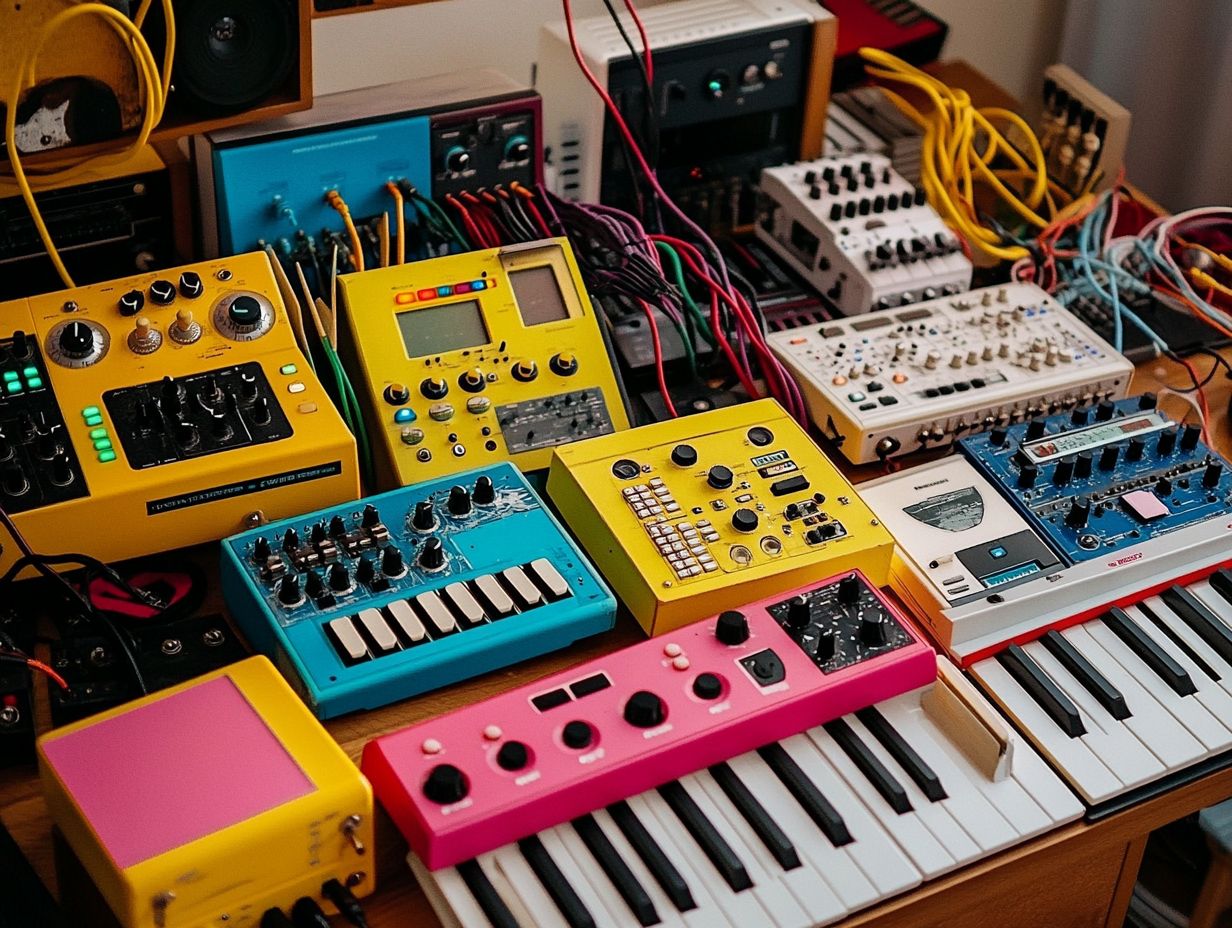
Utilizing specific techniques and methods can significantly enhance the effectiveness of a drum machine in electronic music production, facilitating sound manipulation and artistic expression. Mastering key elements such as dynamic control, pattern editing, and loop creation will enable producers to create beats that resonate with their audience.
Exploring features such as velocity sensitivity and randomized sequencing can further elevate musical compositions, introducing an element of unpredictability that keeps listeners engaged. Experimenting with presets can provide a solid foundation, stimulating creativity when developing unique beats.
Employing sound layering techniques can also diversify drum sounds, resulting in a more enriching auditory experience. By integrating complex rhythm patterns with innovative sound design, producers can navigate a variety of genres and styles, ultimately crafting a distinctive sound that stands out in the competitive realm of electronic music.
Frequently Asked Questions
What are the best drum machines for electronic music?
The best drum machines for electronic music include the Roland TR-808, the Elektron Digitakt, the Arturia DrumBrute, the Korg Volca Beats, the Akai MPC Live II, and the Teenage Engineering OP-1.
Are there any budget-friendly options for drum machines for electronic music?
Yes, there are several budget-friendly options for drum machines for electronic music, such as the Korg Volca Beats, the Teenage Engineering PO-33, and the Behringer RD-8.
What features should I look for when choosing a drum machine for electronic music?
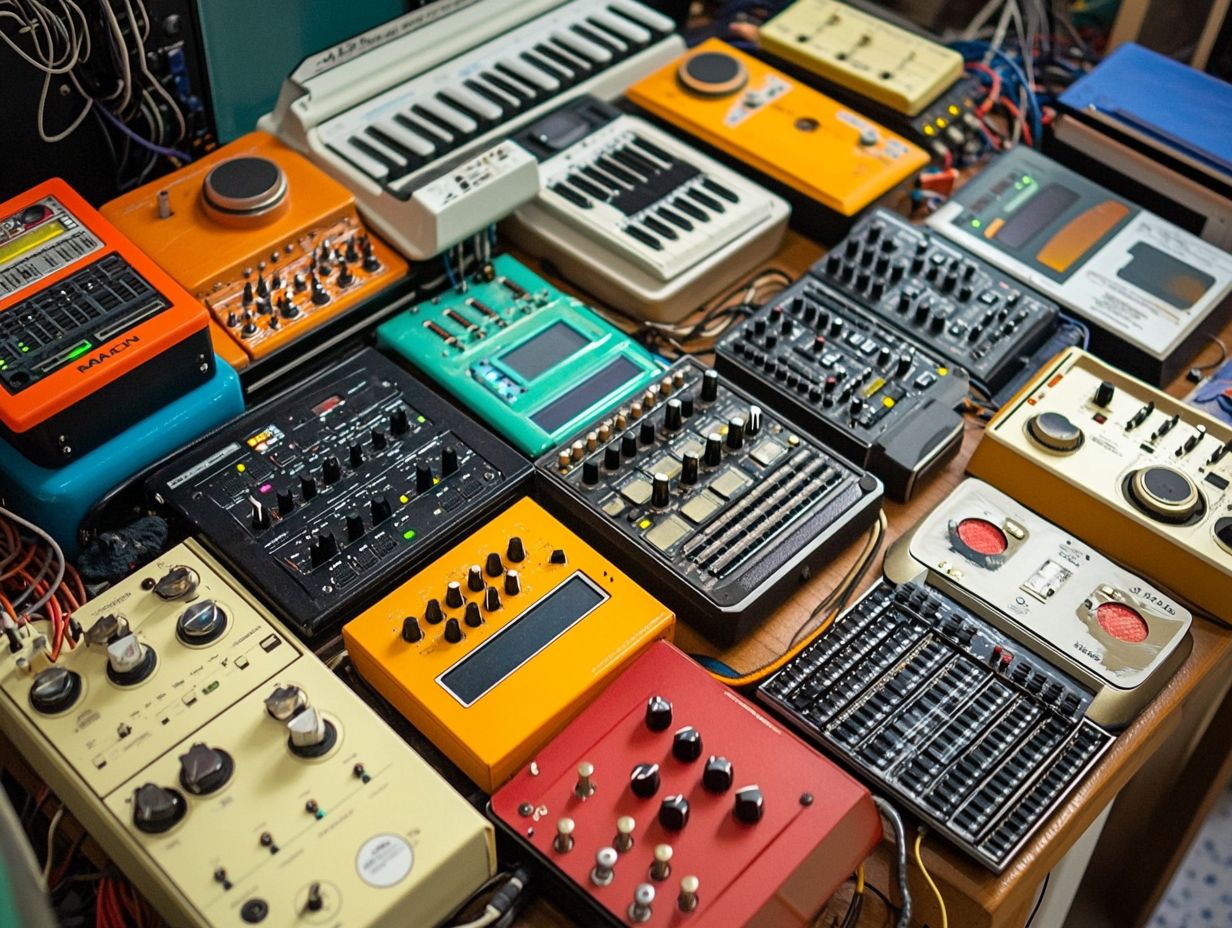
When choosing a drum machine for electronic music, look for features such as a wide range of drum sounds, intuitive sequencing capabilities, the ability to import or create custom samples, and real-time performance effects.
Can I use a drum machine for live performances?
Yes, many drum machines have been designed specifically for live performances and offer features such as touch-sensitive pads, live pattern sequencing, and real-time effects that make them ideal for live use.
Are there any drum machines specifically designed for certain genres of electronic music?
Yes, there are drum machines that have been specifically designed for certain genres of electronic music, such as the Roland TR-909 for techno and house music and the Elektron Digitakt for industrial and experimental genres.
Can I connect a drum machine to my computer for recording and production purposes?
Yes, many drum machines have USB or MIDI connectivity options, allowing you to easily connect them to your computer for recording and production purposes. Some even offer software integration for advanced control and customization options.

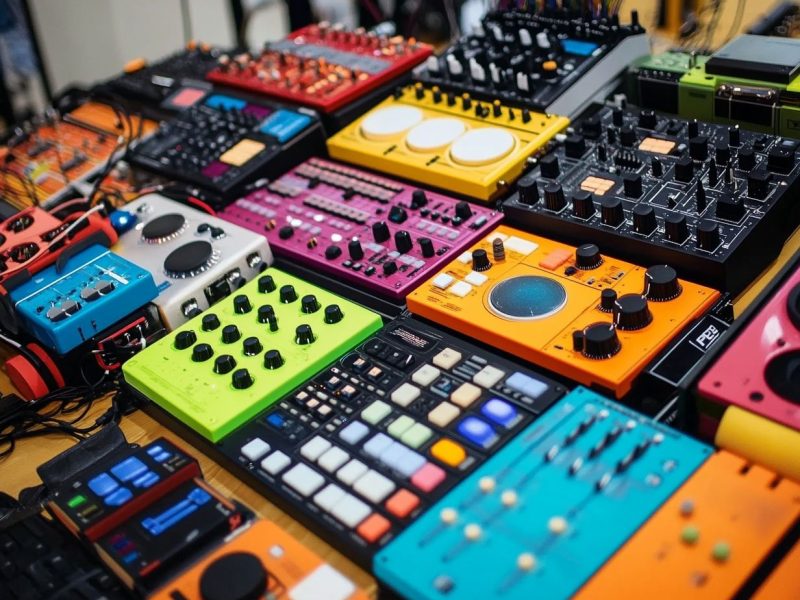
 Top DJ Headphones: A Comprehensive Guide for the Best Sound Experience
Top DJ Headphones: A Comprehensive Guide for the Best Sound Experience